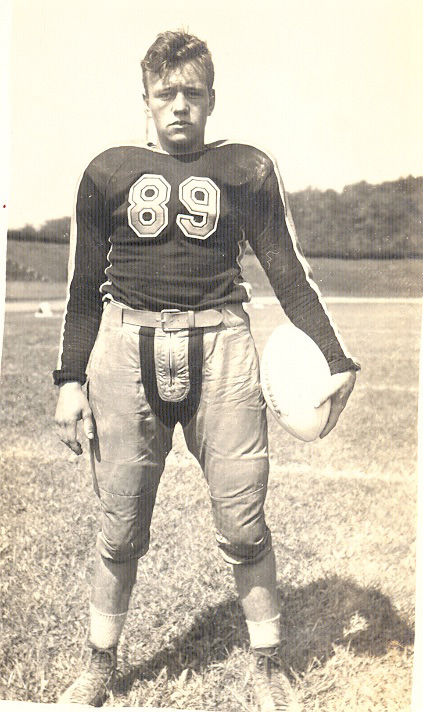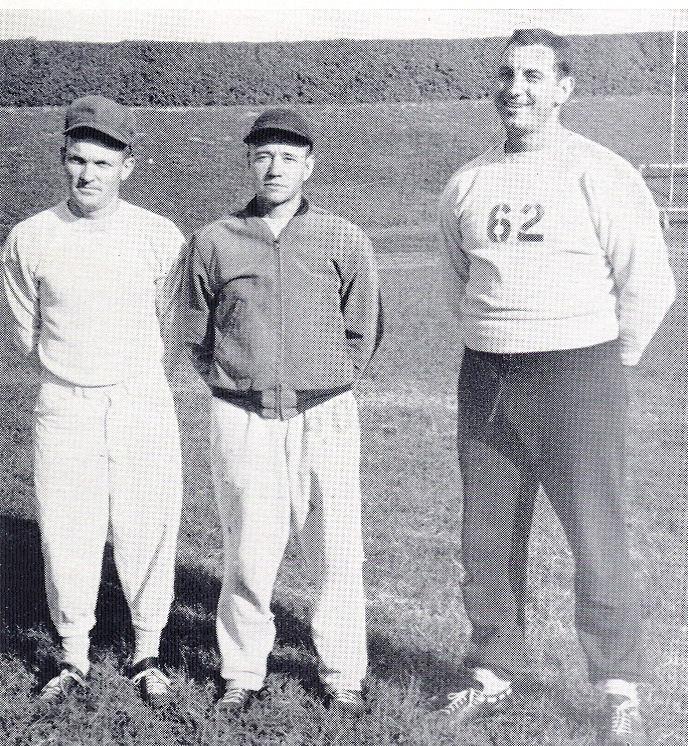By Trey Williams
Science Hill Hall of Famer Kermit Tipton might’ve said less while coaching Science Hill’s football team for a decade than his most famous player, Steve Spurrier, said in a media luncheon before playing Georgia or Tennessee.
Tipton let his play and his coaching do the talking while helping create two of the Science Hill football program’s most successful eras.
Spurrier was the driving force in 2010 when Science Hill chose to name its new football stadium in honor of Tipton. It was quite a sight to see Kermit Tipton Stadium on a scoreboard with a Jumbotron and a synthetic surface. Smiles were all around the stadium that night and the 88-year-old Tipton, not one ever eager for hoopla, made a public appearance and flashed an appreciative smile or two.
It seemed like the ideal night to get him to let loose with some thoughts during a halftime interview. But a festive atmosphere didn’t untie his tongue.
What did he think of seeing his name on a snazzy new stadium scoreboard above “Steve Spurrier Field” while an excited crowd cheered his on-field introduction?
“Not bad for an ole Keystone boy,” said Tipton, who would die some 19 months later at the age of 90.
Emory Hale, who coached Oak Ridge to state titles in 1975, ’78 and ’79, played and coached for Tipton at Science Hill.
“Coach Tipton never forgot his roots,” Hale said. “He was from Keystone, and there was a humility with guys coming from Keystone.”
Tipton had cause to crow. He went 74-33-5 in 11 seasons (1956-66) at Science Hill. His final two teams combined to go 18-1-1. The final two teams he quarterbacked for Stewart “Plowboy” Farmer at Science Hill (1939-40) went 20-1-1.
Three newspaper stories noted him eluding numerous would-be tacklers while returning a Walter Lance interception 66 yards for a score in a 31-0 “upset” of Elizabethton in 1940.
Three of Tipton’s most cherished games were a 6-0 win at Knoxville and a 0-0 tie with Bobby Cifers-led Dobyns-Bennett in ’39 and a 21-6 win at Parker (Greenville, S.C.) in 1940. Cifers led the nation in scoring in 1938 (235 points) and ’39 (164 points), had a College Football Hall of Fame career at Tennessee and played four years in the NFL.
However, he averaged less than three yards per carry in the tie at Science Hill.
“Oh yeah, we were very good,” Tipton said matter-of-factly. “Coach Farmer was a fine high school coach. I picked up several aspects of his coaching that I liked and tried to expand on. … He was tough to play under. He didn’t stand for any foolishness or anything.”
The Hilltoppers rode a train to Knoxville for the 6-0 victory in ‘39.
“A bunch of people here in Johnson City got some money together and we rode down on the Special,” Tipton said. “One of the moments I most enjoyed was when we beat the ole Knox High School six to nothing. Vincent Darden intercepted a pass and went about 70 yards with it – the only score of the game. …
“That’s the one that usually sticks out in my mind. That was really a beat-up football game.”
Science Hill won in Greeneville against Parker in the next-to-last game of Tipton’s career, and his performance inspired Johnson City Press-Chronicle writer Doug Bean: “It’s time Kermit’s general excellence is being recognized. Not only is he the smartest field general Science Hill ever had, but he also takes his place as one of the two best blockers, the other being Jeep McCarren. On one play Friday at Greeneville, I saw Tipton butt one Parker man off his feet and then Tip dove into two more and got them out of the way.”
The late Arthur “Bud” Kelsey worked to help support the family long before he was out of high school and he was a man’s man before most of his teammates were anything close to men, according to a handful of the ‘Toppers from those ’39-40 teams. But Kelsey had great respect for Tipton’s mental and physical toughness.
“Kermit Tipton was our quarterback and the brains of our team, and most of the rest of us just played rough,” Kelsey said. “Kermit just knew football. He knew what to call and when. He and the coach were on the same mental plane.
“And he was tough, too. You could tell when Kermit hit ’em or blocked somebody.”
Tipton played football at Milligan College two years before going to World War II.
“Coach Tipton was in part of the (Allied) Invasion of Italy,” Hale said.
When he returned, Tipton played baseball at Milligan while finishing an undergraduate degree. Tipton began his head coaching career at Lamar, where he also coached basketball and baseball. He got a Master’s degree in education from Ole Miss in 1953 and was hired by Johnson City Schools to teach and coach at North Junior High in 1955.
“I was his basketball manager,” Hale said, “and I’d never seen a basketball game until I was in the eighth or ninth grade. … Coach Tipton was a good basketball coach, and he may have loved baseball most of all. He would’ve liked to have been the baseball coach at Science Hill, but Coach (John) Broyles had been there years and years, and won state championships. He’d show up to watch them play baseball.”
One of Tipton’s most exciting wins coaching at Science Hill came in his second season. The ‘Toppers defeated top-ranked Oak Ridge, 26-13, after Dr. Litkenhouse had listed the Wildcats as a 30-point favorite.
A 12-year-old Spurrier, who’d recently moved to Johnson City from Newport, attended the game and recalled Hale making three interceptions.
“Coach Tipton was just a tremendous influence on all of us, especially me, and whatever kind of coach I became later, I think a lot of it had to do with Kermit Tipton.”
Steve Spurrier
None of numerous players or coaches from that game could recall Tipton being demonstrably excited after the huge upset.
“Coach Tipton was glad we won,” Hale said, “but his demeanor was such that he was never going to show a lot of emotion.”
Tipton barely revealed a pulse at halftime of the Exchange Bowl during Spurrier’s senior season. Science Hill was coming off its second win against Dobyns-Bennett in as many years and had stunk it up in the first half against Church Hill to fall in a three-touchdown hole at J. Fred Johnson Stadium.
“Coach Tipton didn’t say anything (when he entered the locker room),” Hale said. “He just went over and laid on the warm-ups until it was about a minute until we were supposed to go back on the field. I kept looking out and thinking ‘Say something. You gotta do something here. We’re getting killed.’ And finally Coach Tipton stood up and he said ‘I just thought you guys were better than this.’
“Man, everybody jumped up and started screaming and hollering and going on. And Steve Spurrier and (receivers) Jimmy Sanders and Tommy Thomas, who was a sophomore, got it going. Boy, Steve was dropping it on the button; I’m talking 30-, 40- and 50-yard passes … and Jimmy didn’t break stride. That was one of the most phenomenal performances I saw, and a lot of that was Coach Tipton’s ability to motivate.”
Tipton might not have had Spurrier’s gift of gab, but Spurrier tried to emulate a lot of Tipton’s style.
“Coach Tipton was just a tremendous influence on all of us, especially me,” Spurrier said. “And whatever kind of coach I became later, I think a lot of it had to do with Kermit Tipton.”





